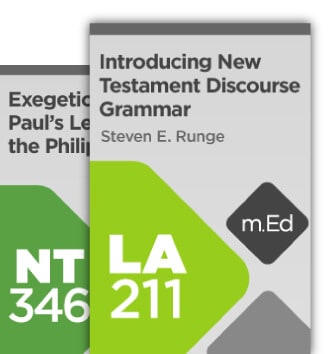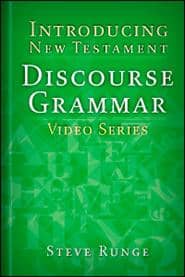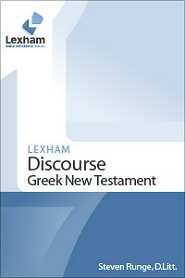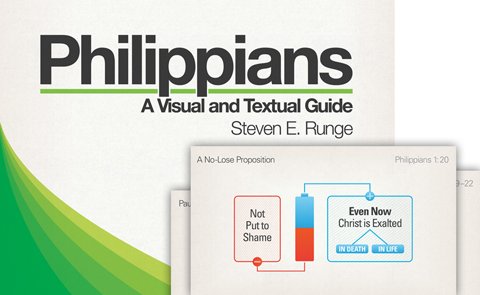Dependent adverbial clauses are a common feature of Koine Greek, generally categorized based on the kind of content conveyed (e.g., conditional, comparative, spatial, temporal, reason/result, etc.). While many spatial and temporal adverbial clauses...
I remember having my world turned upside down when I learned that there is a positive version of name-calling in the Bible. It’s everywhere. What might come to mind for you are places like Matt. 3:8 where John the Baptist greets the religious...
The Greek text has much to offer those teaching and preaching, but gleaning these insights can be a frustrating experience. Too often, people expect that word studies or assigning a syntactic label to a construction is as good as it gets. But the...
The following is excerpted from the High Definition Commentary: James. It is a sidebar about the linguistic implications of adopting (or rejecting) gender-inclusive language when NT writers directly address their audience. Should we stick with...
How is your summer going? How is your summer reading of Scripture going? Here’s another quick tip that can help you more deeply engage and understand what you are reading. As with all of the Summer Reading Challenge posts (here and here), the...
Most of the time when we are reading the Bible, we read about what happened to biblical characters e.g., David killing Goliath, Jesus feeding the 5000. In some places we even learn about what will happen in the future, as in the book of Revelation...
For those of you wondering where I’ve been, for the last two weeks I was at the Wales Evangelical School of Theology (WEST) and Cambridge, teaching and attending conferences. At WEST I taught a class similar to the Mobile Ed course now on Pre-Pub...
Steve’s on vacation to Glacier Park, Montana this week, but he posted this note from the road. Have questions about what the Summer Reading Challenge is? Read last week’s post for the details, and be sure to join the discussion at...
We are heading into the summer vacation season, the perfect time to let your bible reading go on vacation too! I am issuing a Summer Reading Challenge for those wanting to either enhance (or begin!) their regular time in Scripture. How? I will be...
Names are typically the best way of quickly achieving identification, especially if the person is already know to everyone. But sometimes context demands that you do something other than the ordinary. TV programs are a great modern example of this...
We’re going to take a look at another passage found in all three Synoptic gospels recounting Jesus’s response to the Pharisees complaint about His disciples plucking grain on the Sabbath in violation of law. All three gospels have the...
One of my favorite applications of discourse grammar is reading the Synoptic gospels, well, synoptically. Mathew, Mark and Luke have enough overlapping content that scholars often study the stories in parallel using what’s called a synopsis...
The final installment of this series on participles focuses on the practical payoff of letting Greek be Greek. What do I mean by this? Writers make rhetorical arguments that rattle our theological cages. Take a look at a literal translation of Gal...
The Problem Few would deny the importance of learning Greek, Hebrew, and Aramaic for teaching and preaching. Despite this high view of the original languages, I’ve heard numerous pastors lament the limited practical payoff of investing...
Although the Scriptures' overall message is simple enough for even children to understand, there are spots in both testaments where the original-language grammar gets pretty complex. Complex enough that English translations often simplify it for...
One of the big challenges in studying Old Testament stories is identifying the central character, the one to whom the writer wants you paying close attention. This is especially true in complex stories like that of Jacob stealing Esau's blessing, in...
Logos Talk is bringing you special Holy Week devotionals from a number of authors. If you’d like more resources to prepare your heart for Easter, Logos has discounted a number of Holy Week titles. Expectation Expectations play a huge role in how we...
We announced the Steven Runge’s presentation of Discourse Studies and Biblical Interpretation: A Festschrift in Honor of Stephen H. Levinsohn to Levinsohn on the blog on July 5. Here is the story behind this event. We all have people...
Just in case you were wondering, Greek is different from English. But it’s not just the words that differ, there are also different preferences about how to get certain jobs done. These differences often result in a mismatch, where English won’t...
This is a follow up to an older post where I made reference to something going on in Exodus 18. My topic today is the practice of orienting participants to a situation. For instance, I could be introduced or “anchored” as “the...
As much as I like reading, there is just something about video that goes way beyond text alone. Even better is to see and hear an author teaching what they are passionate about. It is a great complement to just reading their book. This is exactly...
No, this is not a post about gender differences, but about one of the most under-appreciated Greek words you’re going to find. It is pronounced just like men in English. It is one of those words that causes translators fits, and is left untranslated...
One of the big hurdles in preaching is bridging the cultural gap between our present setting and the society in which the NT documents were composed. It gets even harder when you realize there is actually more than one gap. Take the Apostle Paul for...
In a previous post about which commentary is best, I introduced an important point: studying and faithfully communicating a passage is about more than knowing the details. Though details are important, they must be synthesized into a whole, and then...
How it used to be done When I first began my seminary training in 1992, things were a little different. Doing research meant going to the library and digging through a literal card catalog (yeah, the kind with 3 x 5 cards). I learned about the...
Alright, I’ll admit that I am a word nerd, especially when it comes to Greek conjunctions. These are the function words like “therefore” and “because” that tell you how to connect one statement with the one that follows. If you look at Dan Wallace’s...















